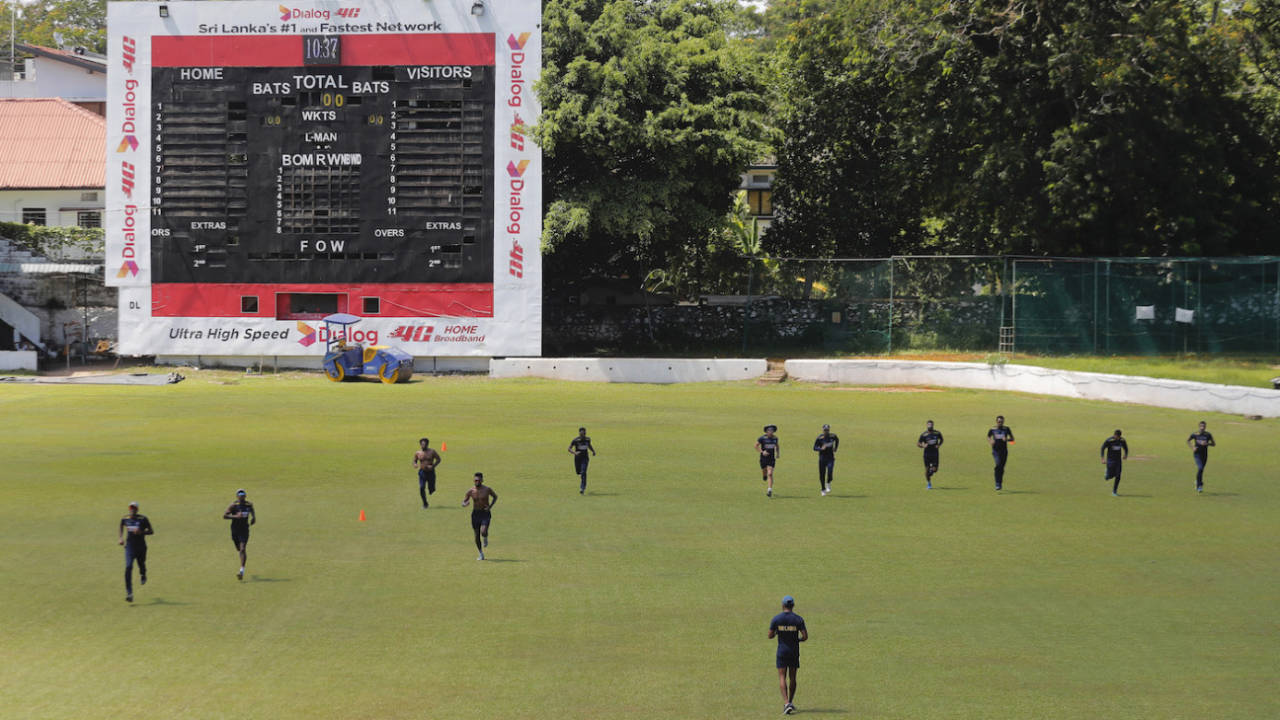Sweat not as effective as saliva, Sri Lanka bowlers tell coach Mickey Arthur
"Saliva was their preferred mechanism of shining the ball," Arthur said after the first day of Sri Lanka's post-lockdown nets sessions
Andrew Fidel Fernando
03-Jun-2020
Associated Press
The feedback from Sri Lanka's bowlers on the first day of post-lockdown nets sessions, is that sweat is not quite as effective for ball management as saliva.
This is what the bowlers reported to coach Mickey Arthur, who is part of the ICC cricket committee that made recommendations last week to use only sweat while the Covid-19 pandemic ran its course. The recommendations were aimed to minimise infection.
Six members of the 13-man squad that began the 12-day "residential training camp", are fast bowlers.
"It was interesting chatting to the bowlers, who said sweat made the ball a little bit heavier than saliva did," Arthur told ESPNcricinfo. "Saliva was their preferred mechanism of shining the ball. But it is what it is now, you've just got to get on with it.
"Because I'm on the [ICC] cricket committee, I do know the debates and the chats that went around the recommendation to avoid using saliva on the ball - though you can use sweat on the ball because it's been proven that sweat is not a real threat. The consensus in that committee meeting was: 'Oh, well, if you can put sweat on, then it's ok. It's almost the same.'"
Although there is a broad consensus that for the time being the use of saliva on the ball should be avoided, there have been calls from leading voices in the game to allow the use of an artificial substance in place of saliva, in order to ensure that fast bowlers' threat does not diminish substantially past the first few overs of the innings. Jasprit Bumrah, for example, said that if saliva is banned there should be "some alternative for the bowlers to maintain the ball".
The ICC cricket committee resisted calls to greenlight outside substances, however, not least because the committee had strengthened punishments for ball tampering, in the wake of 2018's tampering sagas - particularly Australia's use of sandpaper in Cape Town.
"I will take this feedback back to the cricket committee, but I also know what the whole debate was around that issue," Arthur said. "At the meeting last year, we actually recommended harsher penatlies for mints or any illegal substance on the ball, and it's amazing that a year later we are discussing whether they can use artificial substances. It was almost a contradiction.
"The theme of the meeting when that discussion came up was around the fact that even if it made it a batters' game for a bit, we just had to get cricket on. The focus was getting cricket on without making it too complex. If we allowed them to put an artificial substance on, for example, and Covid goes away in 18 months' time or whenever, do we say: 'you can't use an artificial substance on the ball' again? We would have just confused everything. There are other ways of evening up the contest for the bowlers as well - by leaving extra grass on the pitch etc."

AFP
In addition to avoiding saliva on the ball, Sri Lanka's training squad is also adjusting to a highly unusual training and living environment, in order to prevent infection. The 13 players and four support staff are essentially in their own bubble, going from hotel to ground and vice versa, in central Colombo. No one is allowed to leave either venue for personal reasons.
"Every morning we're having temperatures taken every time you leave the room," Arthur said. "We're wearing masks all the time. It's almost total isolation, because in the hotel we've got our own eating area, the gym is cleared during our gym sessions and they clear the pool for our recovery sessions. There's no interaction with anyone else apart from the little bubble that we're in. We were washing hands regularly as well. It is so different, but everybody's sort of embraced it, as we have to. Dr Daminda Attanayake - our health advisor - she's been absolutely outstanding."
The training session on Tuesday had been interrupted when captain Dimuth Karunaratne suffered a heatstroke, requiring medical attention. He is expected to be back training on Wednesday, however, according to Arthur.
"They are doing a few more precautionary tests on Dimuth, but soon as those are done he'll be up and ready to go. He's a determined bloke."
Andrew Fidel Fernando is ESPNcricinfo's Sri Lanka correspondent. @afidelf
